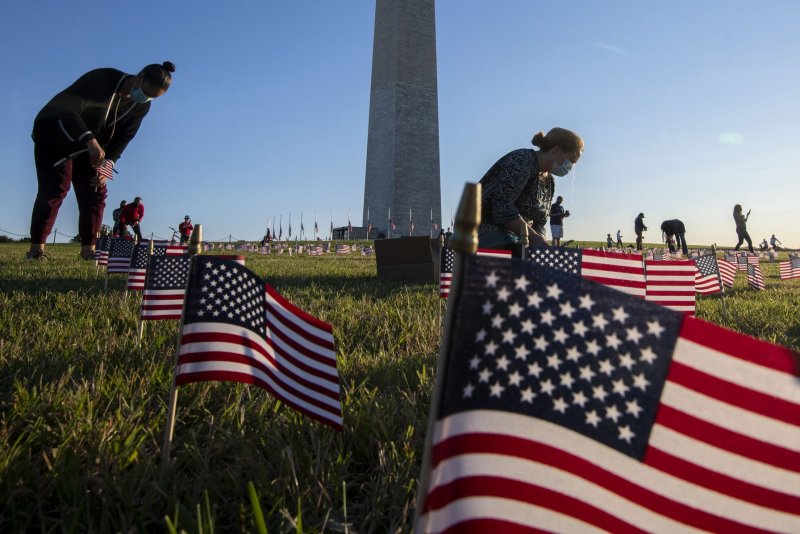Volunteers with the COVID Memorial Project plant 20,000 American flags on Monday near the Washington Monument, on the National Mall in Washington, D.C. The project on Tuesday will pay tribute the 200,000 Americans who have died from the outbreak. Photo by Pat Benic/UPI |
License Photo
Sept. 22 (UPI) -- A new global survey Tuesday showed that nearly 60% of people in more than a dozen nations believe that greater international cooperation would've helped stem the COVID-19 outbreak.
Pew Research Center found that 59% of respondents said more cooperation with the international community would have kept cases lower in their native country.
The question was part of a Pew survey gauging sentiment in 14 nations about international cooperation.
Eighty-one percent said all nations should take steps to act more as a global community that works together to solve problems.
The poll also sought feedback on how respondents view the United Nations, which began the debate portion of the 75th General Assembly in New York City on Tuesday.
While the global body is widely viewed as an organization that promotes peace and human rights, fewer people believe it effectively handles international issues or cares about ordinary citizens.
Barely half of respondents said the body efficiently handles global issues and just 53% said it cares about the needs of citizens.
In the United States, most (72%) said the United Nations promotes peace and many (70%) agreed that it advocates for human rights. Just 51% said it effectively handles global issues and 55% said it promotes action against infectious diseases, like COVID-19.
Young people between the ages of 18 and 29 were most likely to view the United Nations and World Health Organization favorably. Seventy-two percent said they have a positive view, compared to 58% of those over 50.
In the United States, 62% said they have a favorable view of the United Nations.
"The U.S. public's views of the organization have been relatively consistent in recent years," Pew wrote. "Still, there has been a large upward shift in approval from 2007, when 48% of Americans had a favorable view."
Politically, nearly 80% of Democrats said that the United States should take the interests of other countries into account when making foreign policy moves, compared to just 31% of Republicans.
Pew surveyed 14,200 adults in Australia, Belgium, Britain, Canada, Denmark, France, Germany, Italy, Japan, the Netherlands, South Korea, Spain, Sweden and the United States between June and August. The survey has a margin of error between 3 and 4.2 points.















